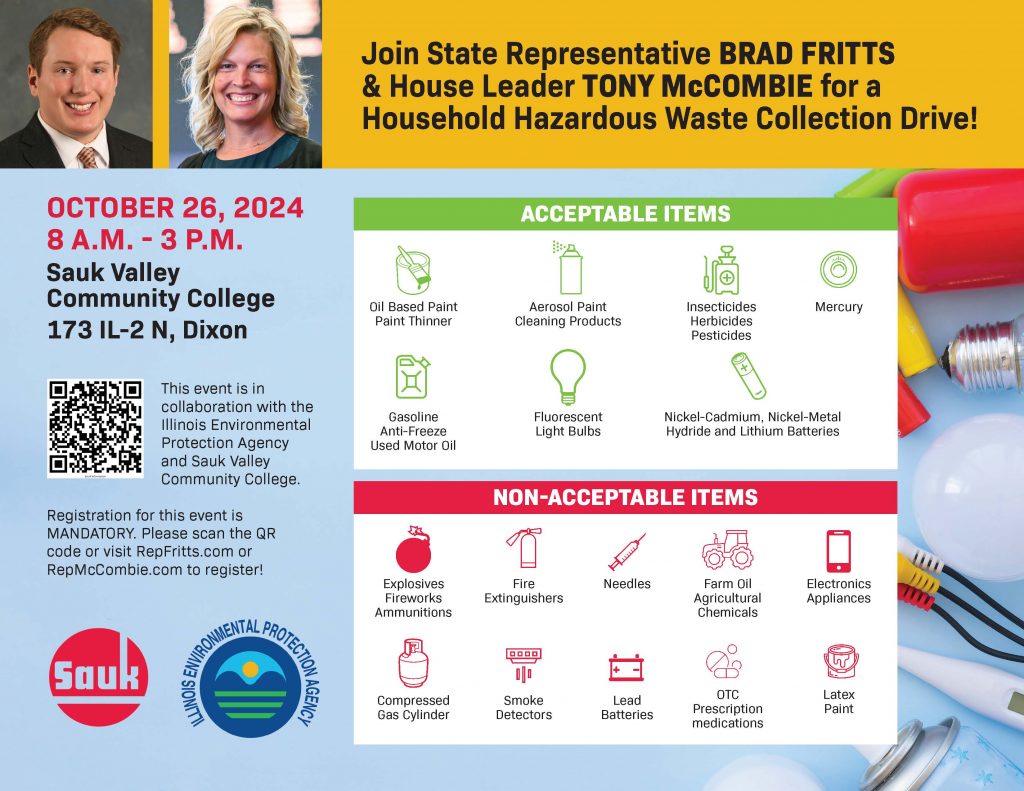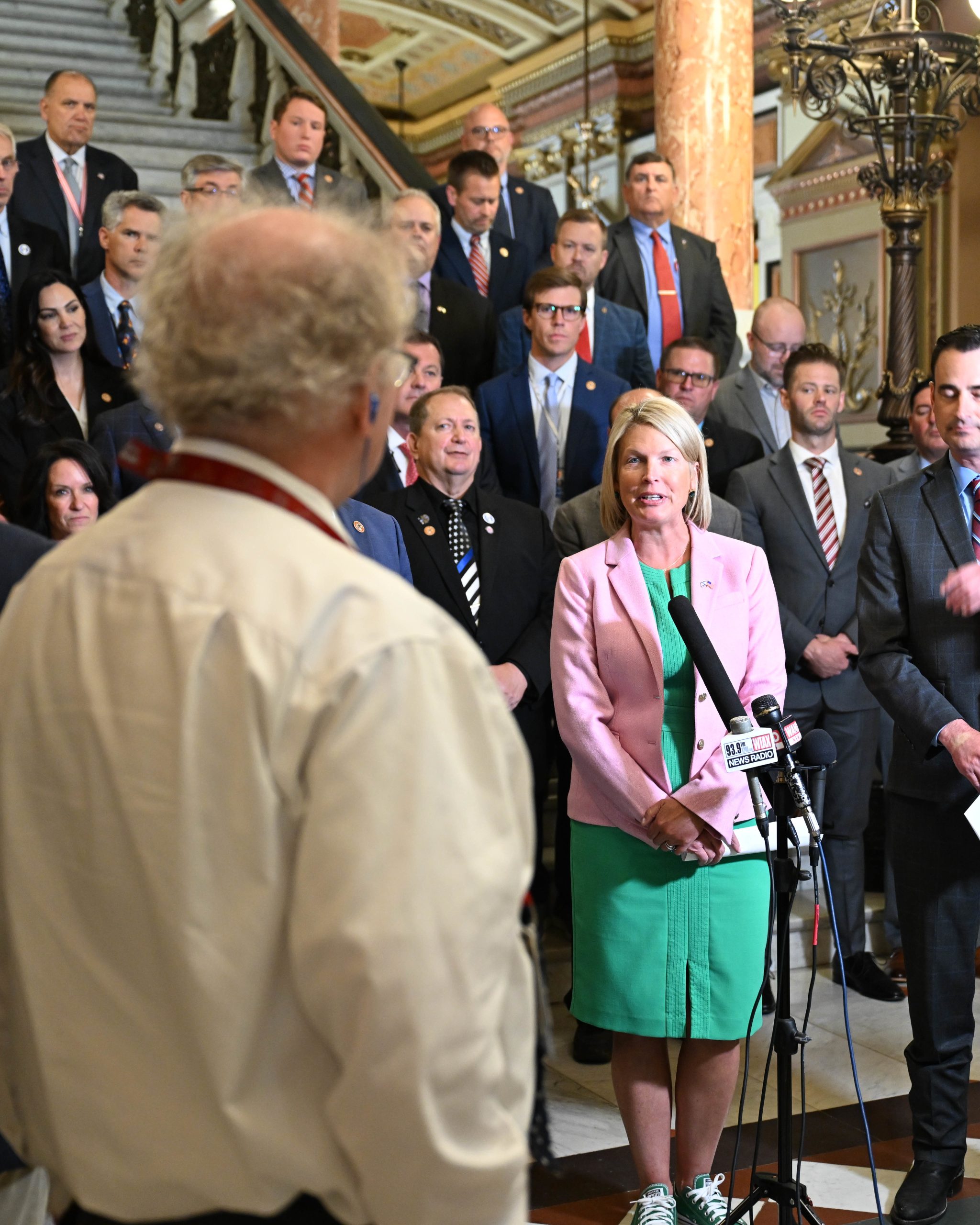GENERAL ASSEMBLY
Pulling back the curtain: Bipartisanship end-around. Partisan working groups have become the favored form of policymaking for House Speaker Emanuel “Chris” Welch since he took over as the presiding officer of the Illinois House of Representatives in 2021. By all appearances, the working groups are his not-so-subtle way of shutting Republicans and, more importantly, the public out of the process. An end-around, if you will, to stave off opposing viewpoints.
By comparison, Senate President Don Harmon doesn’t feel the need to engage in these partisan shenanigans. Instead, he has opted for public hearings in the committee framework set forth in the Illinois Constitution. This leads us to question the Speaker’s intentions.
The Speaker’s Democrat Senate counterpart holds bipartisan public committee hearings on important issues like the teacher shortage, public safety, immigration, and most recently, public transit. The Speaker could do the same, after all, House Rule 13 gives him the authority to create bipartisan committees whenever there is a need. Nonetheless, the Speaker has gone in a different direction, establishing Democrat-only behind the scenes working groups, including these:
o Firearm Safety and Reforms Working Group
o Public Transit Working Group
o Reproductive Health and Dobbs Decision Working Group
o Social Media and Online Extremism Working Group
o Teacher Shortage Working Group
So, why does the Democrat Speaker prefer one-party, closed-door working groups? If the outcomes of past working groups are any indication, the goal is to stifle debate, prevent the vetting of controversial legislation, and even more egregious, keep the public in the dark.
Illinoisans deserve a deliberative, inclusive, and transparent legislative body that is responsible to its Constitutional duties. In addition, Illinoisans deserve a legislative body that works within the committee process, allows for public hearings held at times when the public can attend, and robust debate from a bipartisan group of lawmakers.
Senate President Harmon understands the need to bring his chamber together, both Democrats and Republicans. He’s not afraid to consider the myriad of viewpoints and the vast experiences that all members of his chamber bring to the table. Harmon’s bipartisan Senate Transportation Committee is working to address the issues by holding public hearings around the state to gather the information that all senators will need to cast an informed vote.
When announcing his newly formed “Transportation Working Group,” the Speaker said the working group … “members will talk with stakeholders, review transportation proposals and create new solutions for public transit.” Republicans will not get the opportunity to weigh in nor, it seems, will the public.
As the minority caucus, the role of the House Republicans is to hold the majority accountable, shine a light on improprieties, and speak out when the more than four million Illinoisians they represent are not included in the process that affects their everyday lives. We feel it is important to call out the Speaker’s working group strategy and urge him to allow full debate of these important issues in committee.
We have to ask: What is the Speaker afraid of? After all, Democrats hold the supermajority and they can pass or kill any piece of legislation they want with their votes. Why not hold in-depth hearings and consider testimony from all sides of an issue? Why the need to suppress debate? Why stand in the way of public bipartisan committee hearings?
Shutting out the public and opposing views makes for a vicious cycle of partisanship. Speaker Welch could easily reverse this by adhering to his promise when he was first elected to lead the House, which was to work with Republicans in a bipartisan manner and to ensure all Illinoisans have a voice in Springfield.
CORRUPTION
Former longtime Chicago Alderman Ed Burke reports to prison. The former Chicago alderman and dean of the City Council Ed Burke has begun to serve his two-year sentence for racketeering, bribery, and attempted extortion. The onetime political boss is now confined to a low-security section of the federal correctional center in Thomson, Illinois, north of the Quad Cities. “Welcome to Carroll County and District 89, Alderman Burke… I hope your stay is a comfortable one,” said Leader McCombie
Burke reported to prison after a saga of almost 6 years in duration. After the Federal Bureau of Investigation (FBI) raided the alderman’s Chicago offices in November 2018, it was clear that the politician was under serious criminal scrutiny. Even after being charged with multiple federal criminal counts in January 2019, his case continued to move slowly. After numerous continuances and delays, the trial began in late 2023, more than four years after Burke had been charged. The now-former alderman (after 54 years in office, Burke did not run for re-election in 2023) was convicted in December 2023. The verdict was “guilty” on 13 of the 14 counts against him.
Former Alderman Burke’s sentencing cycle consumed an additional six months, as the prosecutors and defense counsel presented sentencing information to the court. On June 24, 2024, the court sentenced Burke to serve two years of confinement and pay a $2 million fine. Burke was then given almost three additional months to put his affairs in order. Finally, in September 2024, the former Chicago political leader reported to federal prison.
Illinois families deserve a state government that is honest and transparent. For decades, Illinois politics has been synonymous with corruption, with major scandals landing leading figures in both political parties in prison. Now, the most powerful and influential politician who ruled over state government for nearly 40 years has his date with justice in federal court. Longtime former House Speaker Michael Madigan is set to stand trial just weeks from now, facing a 23-count indictment on racketeering and bribery charges.
Ironically, the former speaker’s defense lawyers have asked the trial judge to ban the word “corruption” from being used during the trial, contending that it would prejudice jurors against him. They also want the word “patronage” banned. The term applies to government jobs given to associates in exchange for their campaign work and/or cash contributions. Speaker Madigan was well-known for having an extensive patronage operation.
Regardless of the ultimate verdict in the upcoming Madigan trial, we need to take action to eradicate corruption in state government and begin to restore public trust. As the Illinois House Minority Leader, I am spearheading efforts to advance the commonsense ethics reforms we need in Springfield. Ethics legislation my caucus members and I have filed include:
- House Bill 4119– Stops political campaign donations being used to pay for criminal defense.
- House Bill 1277– Suspends pension payments if the member or participant is charged with a felony.
- House Bill 4286– A revolving door ban on lobbying.
- House Bill 4289– A definition and clarification bill on lobbying.
The Illinois majority has not passed ANY ethics legislation this year as promised, and I would argue any significant ethics reform since I first came to Springfield in 2017. We have watched investigations, arrests, trials, and convictions come and go for decades, and the Illinois House of Representatives over which Speaker Madigan ruled for decades has an opportunity to lead the way to reform the system in a way that ensures public officials are held to the highest standards.
The Illinois House of Representatives is scheduled to return to veto session November 12-14 and November 19-21, in all likelihood shortly after the Madigan trial ends. There are no more excuses, this is the time to pass meaningful ethics reform.
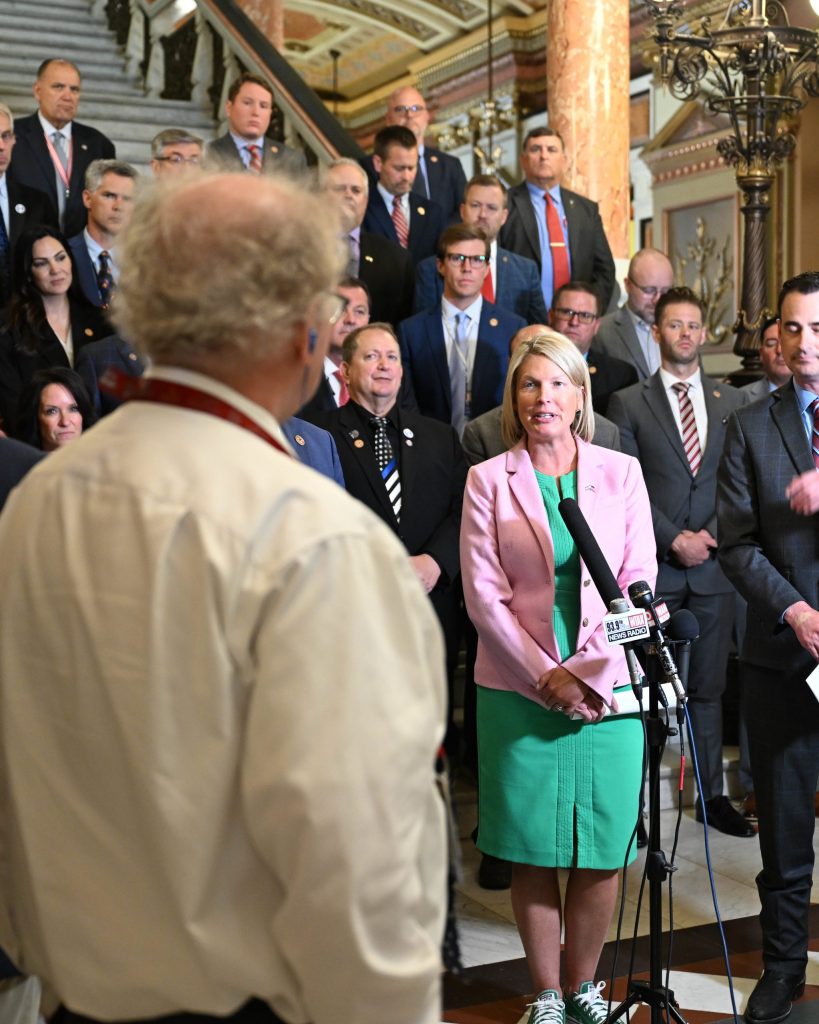
TRANSPORTATION
Rail Safety Week Sept. 23-29. Illinois has more than 11,000 mapped locations where motor vehicles and railroad tracks come together. Of these crossings, 7,550 are public rights-of-way, and 3,744 are crossings located on private property – typically driveways where the property owner has to cross over a track to drive to or from a public road. These railroad crossings are potentially dangerous to drivers, pedestrians, and bikers. Passenger trains can travel as fast as 110 miles per hour.
In the calendar year 2023, 102 collisions and 55 pedestrian incidents were reported at Illinois highway crossings. The collisions resulted in 18 deaths and 22 injuries in 2023, and the pedestrian incidents resulted in 35 deaths and 20 injuries in 2023. The State of Illinois is cooperating with the railroad industry to once again promote railway right-of-way safety through the observance of Rail Safety Week from September 23-29.
DMV CHANGES HOURS
Persons with concerns related to drivers’ licenses are asked to contact the DMV within the Secretary of State’s office. These DMV offices handle a wide variety of standard and commercial drivers’ license concerns, including initial drivers’ licensing, commercial drivers’ licensing, license renewals, and upgrading an existing license into a REAL-ID-compliant license. Traditionally, many of these DMV offices throughout Illinois have opened at 8:00 a.m., and have closed at 5:30 p.m.
Secretary of State Alexi Giannoulias announced this week that most of these DMV offices will change their times of operation. The change will move their opening and closing hours backward in time by half an hour, and the offices that make this change will open at 7:30 a.m. and will close at 5:00 pm. The change will start to be effective in the work week starting Monday, September 23. The change is said to be a response to Illinois customer demand.
Most Illinois residents who are eligible for DMV visits related to drivers’ licenses are strongly encouraged to make reservations ahead of time for a time slot at their local DMV office.
However, many standard services oriented towards motor vehicles, their unique identification, and their licensing and taxation – headed by license plate sticker renewal, vehicle titling, and vehicle registration – do not require a DMV appointment.
LAWMAKER OF THE YEAR
I was honored to be presented with an award from the Health Care Council of Illinois; they named me as one of the “legislators of the year” for my work in the General Assembly.
I am grateful for HCCI’s important work in advocating for nursing home communities across the state, and I look forward to working with them to push our state forward!
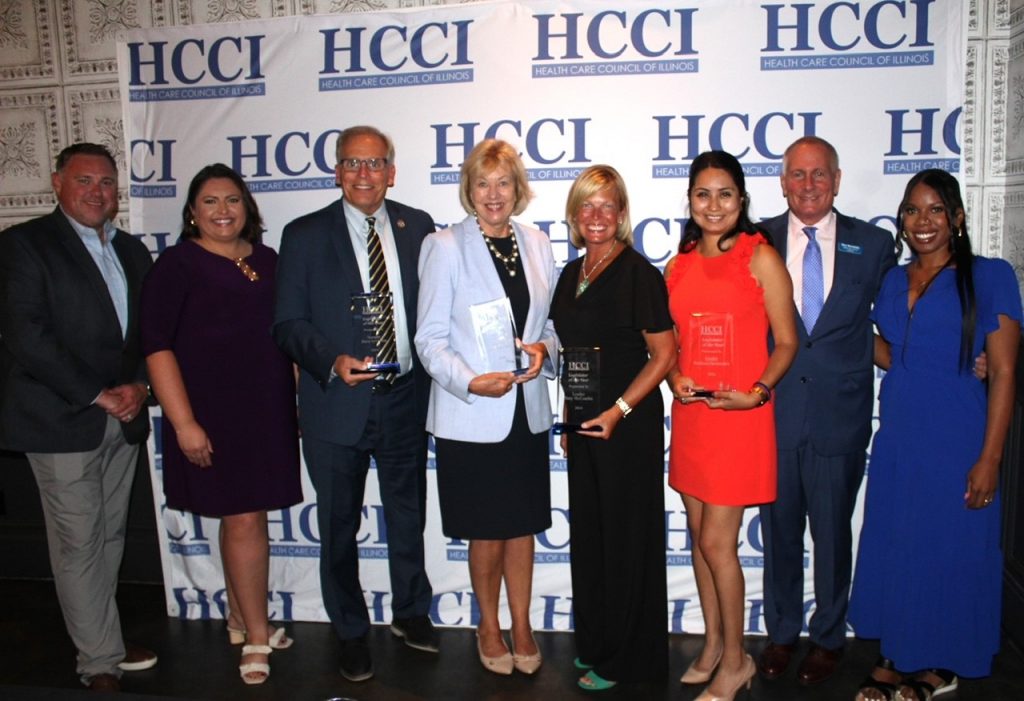
UPCOMING EVENTS
I will be hosting a FREE PAPER SHREDDING EVENT on October 5th!
Any paper documents can be brought to the event to be professionally and securely shredded and discarded at the event:
- October 5th 2024 from 9:00 AM – 12:00 PM at Highland Community College, 2998 West Pearl City Rd. Freeport, Parking Lot B

I am hosting two upcoming “Medicare 101” events in collaboration with the Illinois Department on Aging’s Senior Health Insurance Program (SHIP) and my colleagues, State Representatives John Cabello (Machesney Park) and Jeff Keicher (Sycamore). The events will assist seniors in the community in understanding the intricacies of Medicare on the following dates and times:
- October 24th from 11:00am-12:30pm at Highland Community College, 2998 Pearl City Road, Freeport
- October 25th from 11:00am-12:30pm at Genoa City Hall, 333 E. 1st Street, Genoa
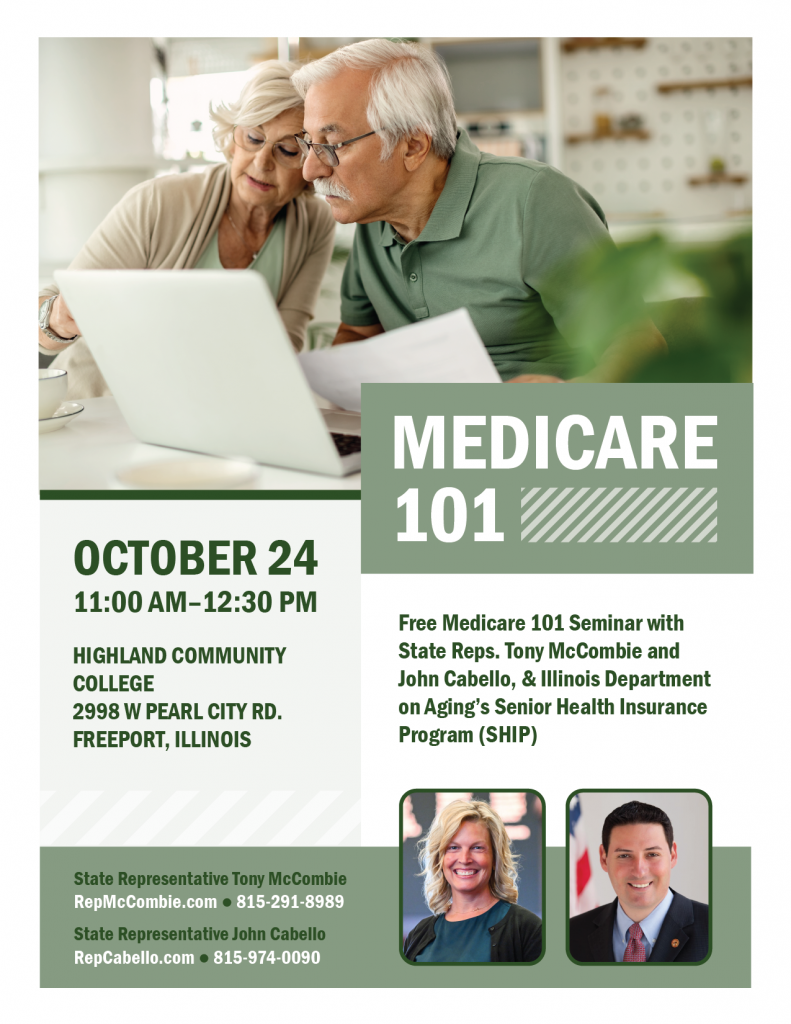
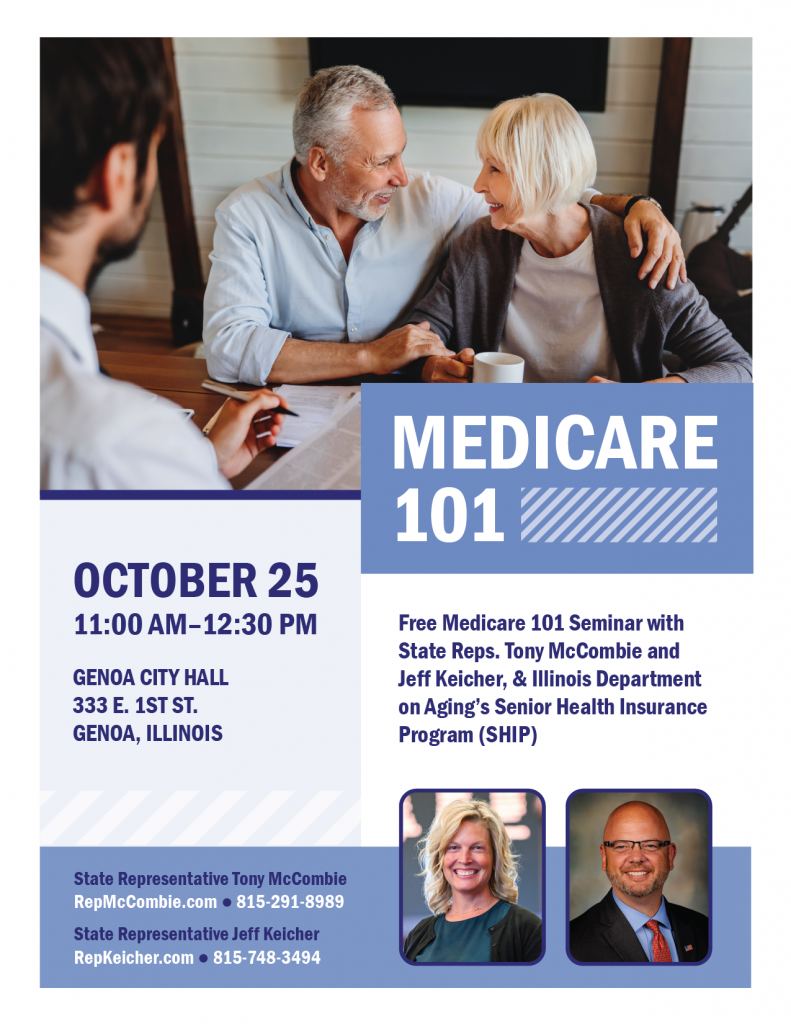
During these informational sessions, experts from SHIP will offer insights and guidance on the many facets of Medicare. Seniors attending the event will have an opportunity to have their questions answered and gain a clearer understanding of the Medicare system, empowering them to make informed decisions about their healthcare coverage.
Lastly, mark your calendars for my Household Hazardous Waste Collection Drive on Saturday, October 26th from 8:00 AM to 3:00 PM. I am hosting this event alongside State Representative Brad Fritts. Reservations are required, so click here to save your spot!
